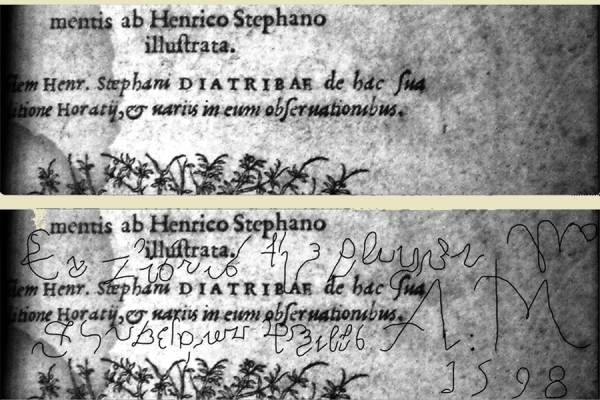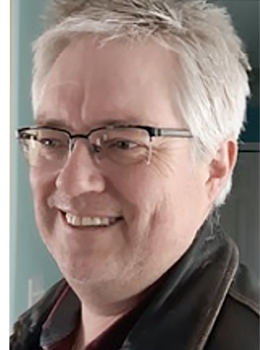 Under ultraviolet light, the title page of a collection of Horace reveals a record by Anthony Munday that he purchased the volume from Shakespeare for four shillings in 1598: “Ex Libris the player W / Shakesper 4 shills A: M / 1598.”
Under ultraviolet light, the title page of a collection of Horace reveals a record by Anthony Munday that he purchased the volume from Shakespeare for four shillings in 1598: “Ex Libris the player W / Shakesper 4 shills A: M / 1598.”
Archeology is all about storytelling, telling an object’s story. As a field archaeologist, UWindsor professor Robert Weir’s specialty is bronze coins found at excavations.
When not teaching courses in archaeology, ancient languages, Greek civilization, or Greek history in the Department of Languages, Literatures and Cultures, he researches ancient coins and for the past decade, antiquarian books.
 “They (bronze coins) are in bad shape and you have to know what to look for,” Dr. Weir says. “Same with old books. You look at the fibers and the paper … I’ve developed an eye for what to look for and where to look -- a ‘spidy sense’. One informs the other. Archeology informs my book research. They have a lot in common.”
“They (bronze coins) are in bad shape and you have to know what to look for,” Dr. Weir says. “Same with old books. You look at the fibers and the paper … I’ve developed an eye for what to look for and where to look -- a ‘spidy sense’. One informs the other. Archeology informs my book research. They have a lot in common.”
Weir believes he has identified a book that once belonged to William Shakespeare, a 1575 book of Horace’s work in Latin that was heavily annotated. Weir used technology to reveal the annotations and has found corresponding references in Shakespeare’s early plays.
It all started in 2016 when he was able to inspect this book in a private library of an owner who wishes to remain anonymous.
When Weir looked at the Horace volume, he noticed markings in certain passages in the poems known as the Odes. These were the only poems of Horace’s that hadn’t been translated into English during the Elizabethan period when this book was published.
“I thought this was curious and began to wonder who could have left these markings,” Weir says.
He did a bit of online research using Early English Books Online (a database in England of everything that has survived) and found that what was marked is not what we think of as the highlight reel of Horace in the 16th century.
“History views Horace as the lyric poet of the Odes, but during the Elizabethan period he was a didactic poet, someone full of wise adages,” he says. “So really, the people who read the Odes, which didn’t exist in English translation at the time, were by and large poets.”
Weir immediately made a list of Elizabethan poets and near the top of that list was William Shakespeare.
He came across a book in the Windsor Library, T.W. Baldwin's magisterial work of 1944 titled William Shakspere's Small Latine & Lesse Greeke, which alludes to something that Ben Jonson said about Shakespeare’s use of classical sources. A chapter on Horace ran about 20 pages.
“So I went through it. Baldwin would mention this Ode, this line and I would look at this 1575 Horace, and yes, there was a mark there,” explains Weir. “I got this nice matchup between Baldwin’s references and the marks in the 1575 Horace. And I thought, wow that’s cool. And it’s not your typical Elizabethan readership profile.”
Weir agrees with the ‘less Greek’ attribution, noting all of the Greek words in this copy of Horace have the English translation written beside them in the margin.
“Chances are that Shakespeare would have received at least some education in Latin, but maybe not enough to allow him to translate the Odes with facility,” he says. “The Odes are tricky. It is no wonder that they were the last of Horace’s poems to be translated into English.”
In the case of the 1575 Horace, Shakespeare would have used signposts left by earlier readers.
Weir has been able to identify specific marks with specific earlier readers, and they highlight the good bits.
“So, I thought, I had better look at these more closely. That’s when I started ultraviolet imaging the marks and looking for other annotations,” he explains. “Because in my experience, you often find things if you look closely.”
During a sabbatical in 2019-20, he worked through the book methodically.
“I’ve imaged most of the poems, but about half of the book is commentary and I haven’t dipped into that at all,” he says.
Weir has been able to construct a chain of provenance of who owned it when. And he’s made notes of what use they made of the book. He continues to research and study the page images, and he continues to make discoveries.
“There are just so many pages to consider that new marks and annotations pop up all the time,” he says.
Weir will discuss his findings in a webinar for the Humanities Research Group entitled “How Shakespeare Read his Horace,” at noon Tuesday, Jan. 25. His presentation will demonstrate ultraviolet imaging and the detailed research that brought to light the people who read Horace and marked the book prior to it being given to Shakespeare – a who’s who of the 16th century.
The event is free and open to the public. Register here to attend via Microsoft Teams.
—Susan McKee





